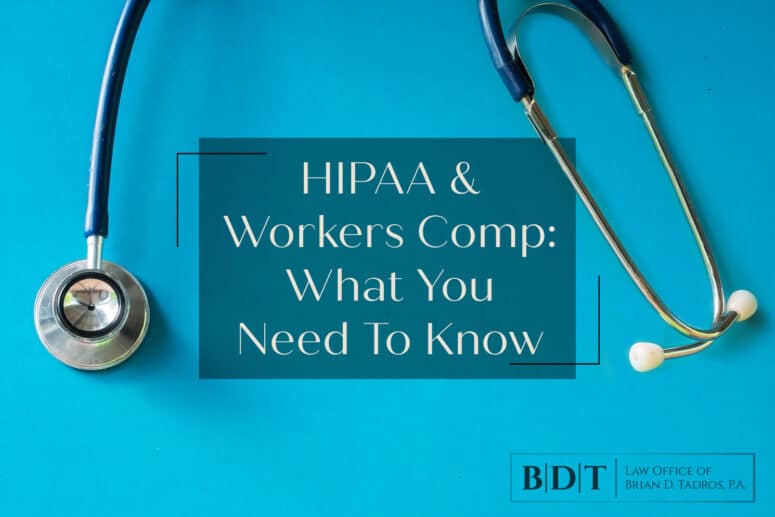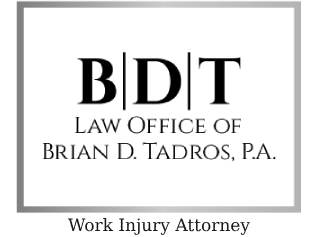
Are work injuries protected by privacy laws?
Here’s everything you need to know about HIPAA and workers comp.
If you have been injured on the job and are being treated through workers compensation, you may have questions about the privacy of your medical treatment as you recover. How much will the insurance company know about your injury? How much will your employer know? Is there any way to keep your health condition between you and your doctor?
Regardless of the extent or severity of your injury, these concerns are valid and it’s important to understand the relationship between HIPAA and workers comp.
Injured at Work In Florida?
The Basics
The Health Insurance Portability and Accountability Act (HIPAA) was enacted in 1996 to protect an individual’s right to privacy regarding their medical information. HIPAA regulates the use and disclosure of protected health information by covered healthcare entities.
While most of us understand HIPAA’s role in our personal healthcare and medical treatment, when we are injured at work and treated through workers compensation insurance, the role of HIPAA becomes unclear.
Workers compensation is a form of insurance coverage used to provide benefits for job-related employee injuries, with a few exceptions. Under a workers compensation policy, employees are compensated for injury or illness sustained or acquired while working, regardless of fault.
But because your employer and their insurance company are intrinsically connected to your injury, many employees have questions about how far this connection goes.

Is My Workers Compensation Treatment Information Protected Under HIPAA?
The short answer is, no.
According to the U.S. Department of Health and Human Services:
“The HIPAA privacy rule does not apply to entities that are either workers’ compensation insurers, workers’ compensation administrative agencies, or employers, except to the extent they may otherwise be covered entities. However, these entities need access to the health information of individuals injured on the job or who have a work-related illness to process or adjudicate claims or coordinate care under workers’ compensation systems.”
This means that if you are being seen for medical care under workers compensation benefits, your doctor can provide medical information to your employer, the workers compensation insurance company, and the Florida Workers Compensation Administrators whether you provided authorization or not.
The scope of this information is limited to only the information needed to either pay for or treat an injured worker’s occupational injury or illness. Your medical provider also has a responsibility to ensure that your workers comp medical files are kept separate from your other medical files and to only share related medical information with the proper parties.
However, in most cases, the insurance company handling your claim will ask you to sign a Medical Records Release form, which allows them access to all of your medical records.
It is very important that you ensure this form is limited in scope to only the medical records that relate to your workers compensation injury and treatment. If you receive a form that does not specify this, you need to request that a new form be sent to limit the scope of their access.
If you have questions about the scope of an authorization form or if you should sign a document provided by the insurance company, contact our office.
Does My Employer Have Access to All of My Medical Records if I Have Been Hurt on the Job?
Not automatically, as there is no centralized database your employer can access whenever they want. However, involving the legal system changes this.
If your case goes to litigation, your employer and their workers comp insurance company will likely retain an attorney, who can (and probably will) issue subpoenas to past and current doctors—regardless of the reason you are seeing them—for purposes of discovery.
Discovery is a legal term that refers to the investigation of facts that might have a bearing on your claim.
For instance, say you had a car accident (either before or after your on-the-job accident) that required medical treatment. The insurance company is allowed to look into the details of that treatment to discover whether or not there is any useful information that could help their case.
Another way this information can be obtained is if you are asked to give a recorded statement.
Because of this, we do not recommend that you provide a recorded statement as an injured worker. That said, if a Petition for Benefits (what we call “lawsuits” in Florida workers comp cases) is filed, the employer’s attorney will take the injured worker’s deposition. The worker will be put under oath and asked a variety of questions and will certainly be asked about prior and subsequent medical conditions and accidents.
It is imperative that you are honest in your responses to these questions! Providing false, incomplete, or misleading information in pursuit of workers compensation benefits constitutes misrepresentation (also known as insurance fraud). This is a third degree felony and a basis for complete denial of any workers comp benefits you may be entitled to.

What if My Employer Finds Out About a Prior Injury or Pre-Existing Condition?
If your employer gains access to or has medical information or records that indicate you had a prior injury or pre-existing condition that relates to the injury you sustained on the job, you should immediately speak with an attorney.
While a prior injury or pre-existing condition does not preclude you from recovering in Florida, it can have a significant impact on your workers compensation claim. Speaking with an experienced workers compensation attorney can help you to understand your rights and how you may still seek compensation.

Is My Workers Compensation Settlement Public Information?
To some extent, yes.
In Florida, workers compensation settlements require some level of approval by the Office of the Judges of Compensation Claims. This is so the judge can approve your attorney’s fees (if any) and determine whether the appropriate amount of money (if any) is being carved out of the settlement amount to be sent toward the injured worker’s child support obligations.
Certain information can be obtained publicly through the Office of Judges of Compensation Claims website. While the actual settlement agreement entered into by the parties is not filed with the judge (and thus not visible on this website), any order from the judge approving the settlement would be. That order will typically document only the amount of the settlement, the amount of attorney’s fees and costs, if applicable, and the amount being sent to child support, if any.
Seek The Advice Of A Workers Compensation Attorney
The issues and concerns surrounding HIPAA and workers compensation claims can be confusing and nuanced. It is important for you to understand your rights under HIPAA and to work with your attorney to ensure your privacy is protected.
However, as outlined, it is likely that your employer will be able to legally gain access to your full medical records at some point.
You certainly don’t want to lie about prior or even subsequent accidents or conditions you have when you are speaking with your workers comp doctors or in deposition, as this is illegal and can result in felony charges and a complete denial of all benefits. However, you should also choose your words carefully and avoid providing any more information than is necessary.
It’s a fine line to walk, which is why an attorney is necessary to provide advice and guidance. Attorney Brian D. Tadros is here to help you answer questions specific to your case, walk you through the process of a workers compensation claim, and help you obtain the treatment and compensation you deserve.
Our experience and expertise will help you to navigate your workers compensation claim and treatment with confidence and sound advice.
Contact our office today to schedule a free consultation to learn more about your workers compensation rights.

